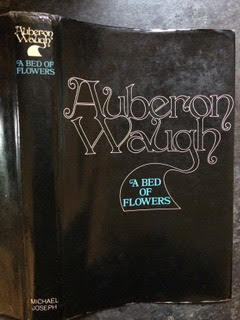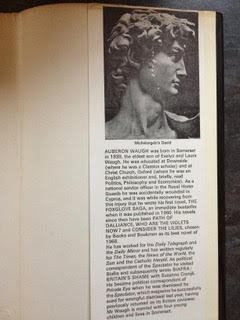The Auberon Waugh Project (sounds like a wildly unlikely prog rock band) is at an end – that is to say, I have completed my self-imposed mission of (re)reading all of A. Waugh's five novels, in order of publication. It's been fun. Though the quality of the five varies, all are entertaining, readable and often funny, and the Wavian prose – elegant, poised, nuancé – is always a pleasure to read.
The last of the novels, A Bed of Flowers, or As You Like It, published in 1972, is, I think, one of the best, perhaps because it rests on a Shakespearean foundation, as the subtitle suggests. It is Shakespeare's pastoral comedy reimagined as a hippie idyll, in all its sweetness and absurdity. It even has characters called Rosalind and Orlando, Celia, Touchstone, old Adam, the Duke (a drop-out businessman, so nicknamed) and a suitably wise and melancholy Jaques (a former priest turned business advisor turned drop-out). They all fetch up at Williams Farm, in rural Somerset, the run-down family farm of one Wee Willie Williams, a rustic who is portrayed throughout in terms of the broadest caricature. His utterances, often beginning with a sound transcribed as 'Ung', are presented phonetically, thus:
'"Oi doan rightly know how anyone of yous is called," he said. "If Oi call one on you Buttercup, you next one moight be called Marigold or Cow Parsley or bloody Nasturtium Leaves for all Oi Care, har, har, har ... Mistress Cabbage Patch, Oi'll say, har, har, har."'
This kind of thing, I'm sorry to say, I found very funny, especially in counterpoint with the stoned babble of the hippies who, drawn mysteriously to the farm, set up a kind of shambolic commune there. The hippies occasionally watch television, and in one scene they are struck with awe by watching Graham Kerr, the Galloping Gourmet, cooking kidneys: '"Oh my Christ, look what he's doing. He must be stoned out of his mind ... How can he do it? I mean, how can anybody be so cool as to just pour all that mustard into one like cooking utensil without even turning a hair?"' etc. Just the kind of stoned nonsense I remember hearing around me all too often in my misspent youth. Thanks partly to the television, this commune does have some connection with the outside world – and it is what's going on there that forms the other strand of this narrative.
What is going on is, in fact, the British government laying the groundwork for what was to be one of the most terrible civil wars in history – the genocidal campaign by the federal Nigerian government against the Ibos, resulting the destruction of the independent state of Biafra and up to two million deaths, mostly women and children starved to death. Waugh embodies the attitudes that led to this situation in the persons of Frederick Robinson, the ruthless businessman brother of 'the Duke', and of Titus Burns-Oates, a devious and massively self-satisfied éminence grise who ensures that the government shares his dim view of the Ibos and backs to the hilt every action taken against them. The satire here is angry but always cool and controlled. A short factual Epilogue makes clear the serious background to the comedy – and A Bed of Flowers is very much a comedy, culminating in happy endings all round. To somehow combine a hippie idyll with the Biafran war – and remain funny – was quite a challenge, but Waugh, I think, pulled it off; perhaps the Shakespearean inspiration was the key.
It's a shame he never wrote any more novels after this one. None of them is likely to be republished, especially in these woke times, but they are all easily available, quite cheap, from online book dealers. A Bed of Flowers, in its original wrapper (see above), is a bit of a classic of early Seventies design too. And here is the author photo on the back flap...
Saturday, 29 January 2022
Auberon Waugh, Novelist: 5
Subscribe to:
Post Comments (Atom)



The name of Titus Burns-Oates curiously combines the name of Burns & Oates, a leading Catholic publisher in England with that of Titus Oates. I infer that Auberon Waugh did not get along with the publishers.
ReplyDeleteYes indeed, it's a clever name for an altogether deplorable character. I doubt if Waugh had many dealings with the very pious house of Burns & Oates (now no longer with us).
ReplyDelete